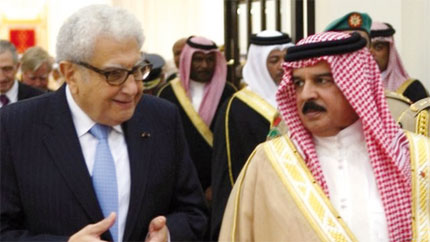
|
 |
 |
|
|
|
|
|
|
|
|
|
|
|
|
|
|
|
|
|
|
|
|
|
|
Bassiouni : A View on the Reality in BahrainIn an interview with the US-based Al-Monitor website, in 13/06/2014, Professor Cherif Bassiouni, head of the Bahrain Independent Commission of Inquiry (BICI), spoke about his opinions and vision concerning the crisis in Bahrain in its various aspects. In an assessment of what has been achieved from the recommendations of the report, that bears his name, Bassiouni said that the Bahraini Government has implemented a number of them for which it deserves recognition, while others are still to be implemented by the Government. Bassiouni added that “What critics see is that these recommendations have been implemented on a piecemeal basis, so that its cumulative impact is not felt when you take something on a piecemeal level. You can say yes it was done, but it loses the cumulative impact when you dilute it over a longer period of time and when you don’t connect them with one another.” In his view, the whole purpose of having recommendations is to provide a means of social comfort in an attempt to bring about a sense of recognition for a group in a given society that their rights are being observed and respected, “And, therefore, it is the cumulative effect of that group that has to be examined as a way to assessing the impact.” Bassiouni wondered about the fate of some of the recommendations, which he regarded as extremely important and capable of having a significant impact, most notably those related to the issue of accountability. On the issue of “impunity”, he said that he has no doubt “that there’s substantial progress that’s been made. It’s always the story of whether the glass is half empty or half full. In comparison to what existed, significant progress has been made. In comparison to what can be done, of course there’s still room to go.”
Bassiouni commended the reforms carried out by the Minister of Interior, who, according to Bassiouni, “has really taken to heart the recommendations. The Ministry of Interior has established an ombudsman, a police professional practices office and the chief of police has been changed. There have been numerous improvements, and the credit really has to go tothe Minister himself.” Bassiouni has identified a problem related to the public prosecution which he felt was not doing enough investigation, perhaps due to the lack of adequate resources. Moreover he believed that “there is also a question of public credibility that the prosecutor’s office does not have good credibility with the victims of the crimes. They frequently report back that they do not get the cooperation of the victims, but they don’t have the cooperation of the victims because the victims feel that they’re intent on doing the job. So why am I going to cooperate with you, when it doesn’t appear that you’re going to be doing your job? And I look at the record, and the record doesn’t indicate that you’re doing your job. It’s a chicken or an egg situation that needs to be examined.” Bassiouni called for more training of prosecutors, giving them more independence, and to provide them with independent resources. In his view, the public prosecution lacks, and hence needs, independent investigators, adding that “They cannot depend on the police to do the investigation” As to his assessment of Bahrain’s human rights record, and its follow-up on the BICI recommendations, Bassiouni said that “There’s no doubt in my mind that the King and the Crown Prince, a number of people in government, like the Ministry of Interior, are committed to making progress. There is opposition. Progress is also linked to a number of political issues; some of these political issues have to deal with the redistricting of legislative elections that are due to come up soon, and the need to recognize the political, social and economic rights of the Shiite population. This is not only a question of investigating violations and things like that, there are very very fundamental social and economic issues involved in the Shiite population that need to be addressed, and have not been addressed.” Bassiouni focused on the segment of Bahraini youth, and saw it of paramount importance “to integrate future generations of Shiites and Sunnis, so that differences can be mitigated and limited, and so that people become Bahraini citizens as opposed to being a Sunni or a Shiite,” and added “ I believe the citizens of this nation can cooperate with one another.” However, Bassiouni did express his worries concerning some segments of the society who are losing the hope “of seeing themselves as equal citizens, as having equal opportunities in a particular country, living in mostly economic underprivileged areas in high-density population areas, they explode. This is a very very normal sociological phenomenon. It’s not Bahrain only, it happens everywhere in the world. Because Bahrain is a small country, it’s going to be felt much more, but it’s bound to continue to increase unless we address the social and economic reasons.” |
